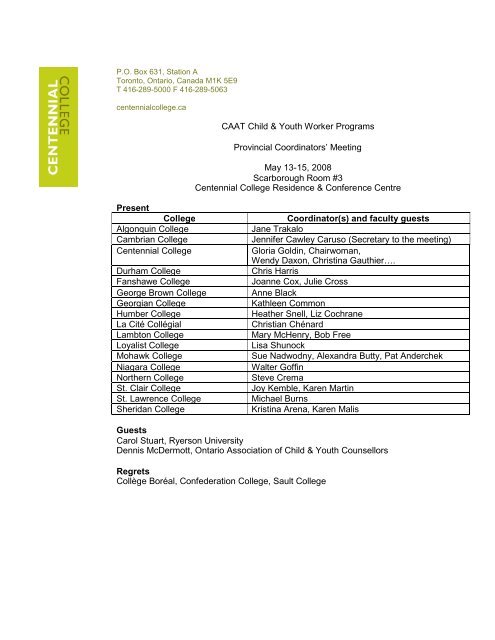CAAT Child & Youth Worker Programs Provincial ... - Mohawk College
CAAT Child & Youth Worker Programs Provincial ... - Mohawk College
CAAT Child & Youth Worker Programs Provincial ... - Mohawk College
Create successful ePaper yourself
Turn your PDF publications into a flip-book with our unique Google optimized e-Paper software.
P.O. Box 631, Station A<br />
Toronto, Ontario, Canada M1K 5E9<br />
T 416-289-5000 F 416-289-5063<br />
centennialcollege.ca<br />
<strong>CAAT</strong> <strong>Child</strong> & <strong>Youth</strong> <strong>Worker</strong> <strong>Programs</strong><br />
<strong>Provincial</strong> Coordinators’ Meeting<br />
May 13-15, 2008<br />
Scarborough Room #3<br />
Centennial <strong>College</strong> Residence & Conference Centre<br />
Present<br />
<strong>College</strong> Coordinator(s) and faculty guests<br />
Algonquin <strong>College</strong> Jane Trakalo<br />
Cambrian <strong>College</strong> Jennifer Cawley Caruso (Secretary to the meeting)<br />
Centennial <strong>College</strong> Gloria Goldin, Chairwoman,<br />
Wendy Daxon, Christina Gauthier….<br />
Durham <strong>College</strong> Chris Harris<br />
Fanshawe <strong>College</strong> Joanne Cox, Julie Cross<br />
George Brown <strong>College</strong> Anne Black<br />
Georgian <strong>College</strong> Kathleen Common<br />
Humber <strong>College</strong> Heather Snell, Liz Cochrane<br />
La Cité Collégial Christian Chénard<br />
Lambton <strong>College</strong> Mary McHenry, Bob Free<br />
Loyalist <strong>College</strong> Lisa Shunock<br />
<strong>Mohawk</strong> <strong>College</strong> Sue Nadwodny, Alexandra Butty, Pat Anderchek<br />
Niagara <strong>College</strong> Walter Goffin<br />
Northern <strong>College</strong> Steve Crema<br />
St. Clair <strong>College</strong> Joy Kemble, Karen Martin<br />
St. Lawrence <strong>College</strong> Michael Burns<br />
Sheridan <strong>College</strong> Kristina Arena, Karen Malis<br />
Guests<br />
Carol Stuart, Ryerson University<br />
Dennis McDermott, Ontario Association of <strong>Child</strong> & <strong>Youth</strong> Counsellors<br />
Regrets<br />
Collège Boréal, Confederation <strong>College</strong>, Sault <strong>College</strong>
1. Minutes of the meeting of 2007<br />
Motion to approve the minutes as circulated<br />
Moved by: Wendy Daxon<br />
Seconded by: Michael Burns<br />
Carried<br />
2. Review of the agenda<br />
Agreement on agenda reached by consensus<br />
3. Current challenges, trends and issues<br />
� Each coordinator reviewed highlights and issues from the 07-08<br />
academic year. Summaries of these presentations are appended.<br />
4. Millennial student update<br />
� A round table discussion identified mental health issues as a<br />
concern which participants wished to further discuss. This discussion<br />
was tabled to the Wednesday afternoon session.<br />
5. a) Curriculum assessment and use of competencies template<br />
� Carol Stuart, researcher and professor in the School of <strong>Child</strong> &<br />
<strong>Youth</strong> Care, Ryerson University reviewed the process employed to<br />
document competencies taught in college and university programs<br />
and to track them within a conceptual framework which identifies<br />
attitudes, skills, and knowledge, evidence-based competence, and<br />
the level of learning as per Bloom’s taxonomy.<br />
� Carol noted that evidence-based practice is rare in child and youth<br />
practice. The agency staff who participated in the research focus<br />
groups indicated that they prefer to do their own training in evidencebased<br />
treatment.<br />
� Evidence-based competence was presented as a goal of postsecondary<br />
programs. Evidence-based competence is defined as a<br />
set of evidence or research which describes what any profession<br />
needs in order to create a competent worker. In child and youth care<br />
such evidence was provided to the research done by Carol Stuart<br />
and Bill Carty through the various documents that describe the<br />
current standards of competence that exist in the field.
) Follow-up report and discussion of the framework used<br />
following use of the competencies template<br />
� Participant colleges described their uses of the research report,<br />
for example, in informing Program Advisory Committee<br />
discussions, guiding curriculum review, supporting students’<br />
understanding of the scope of CYW practice.<br />
� Carol Stuart offered to create a summary checklist (one page) of<br />
vocational outcomes which can be more easily used by CYW<br />
programs.<br />
� Carol Stuart will respond to e-mail requests to receive the spread<br />
sheet and template.<br />
� Carol noted that Pat Anderchuk and her <strong>Mohawk</strong> <strong>College</strong><br />
colleagues in the Learning and Teaching Centre developed the<br />
Excel spreadsheet and pivot tables, the project modified the<br />
sheet. <strong>Mohawk</strong> <strong>College</strong> is advised each time the spreadsheet<br />
template is shared.<br />
c) Coordinators’ resolution<br />
As a group of <strong>CAAT</strong> coordinators of <strong>Child</strong> & <strong>Youth</strong> <strong>Worker</strong> <strong>Programs</strong>, we endorse<br />
the research funded by the <strong>Provincial</strong> Centre of Excellence for <strong>Child</strong> & <strong>Youth</strong> Mental<br />
Health at the <strong>Child</strong>ren’s Hospital of Eastern Ontario, a Centre funded by the Ontario<br />
Ministry for <strong>Child</strong>ren & <strong>Youth</strong> Services. The research was supported by CYW,<br />
<strong>CAAT</strong> coordinators, and included participation by CYW programs from the following<br />
colleges: Algonquin, Cambrian, Fanshawe, George Brown, Humber, St. Clair and<br />
Ryerson University. The research report is entitled “The role of competence in<br />
outcomes for children and youth: An approach for mental health.” (Stuart & Carty,<br />
2006)<br />
The intent of this research was to do the following:<br />
� to review the competencies required for entry-level CYC/CYW practice ,<br />
� to examine how post-secondary programs are educating CYC/CYW<br />
practitioners related to these competencies, and<br />
� to establish a network of educators, employers and policy makers who have<br />
a common interest in standards of CYC/CYW practice.<br />
Of the recommendations generated by the above noted research, the first three of<br />
these recommendations are, in our view, particularly relevant to CYW education in<br />
the province of Ontario.<br />
1. All <strong>Child</strong> and <strong>Youth</strong> <strong>Worker</strong> <strong>Programs</strong> make use of the Curriculum<br />
translation tool developed in this project to compare their curriculum to a<br />
given set of standards (including the <strong>Child</strong> and <strong>Youth</strong> <strong>Worker</strong> Program<br />
Standards/vocational outcomes), in order to identify gaps and areas where<br />
the tangible products of curriculum (course outlines) do not reflect the actual<br />
intents.<br />
2. Standards of practice need to be developed for the profession of child and<br />
youth care/work which link the certification program of the professional<br />
association, the vocational standards defined for CYW programs and the<br />
college and university programs.<br />
3. An accreditation process for child and youth care/work programs to ensure<br />
that the needs and changing practices of the various sectors of the field are<br />
reflected in curriculum in a timely manner.
Resolution<br />
As a group responsible for the curriculum development and training of child and<br />
youth workers in the province of Ontario, the coordinators present at this meeting,<br />
resolve to support the above recommendations.<br />
6. <strong>Provincial</strong> CYW Educators’ Website: spin.mohawkcollege.ca/cyw/caat<br />
Pat Anderchuk, <strong>Mohawk</strong> <strong>College</strong> described the website as a platform for<br />
sharing resources. Notes from coordinators’ meetings, program standards and<br />
other essential information are now found on this site. The group agreed that a<br />
wiki, i.e., a website which can be edited by registered members, would be a<br />
helpful addition to the CYW Educators’ Website.<br />
7. CYC.net<br />
Michael Burns informed the group that the web-based resource CYC.net may close<br />
because of insufficient funds. Currently this resource is funded by the contributions<br />
of researchers and others in the CYC/CYW field. The three founders have<br />
contributed $5,000.<br />
A number of funding efforts are in the development stage. The Ontario Association<br />
of <strong>Child</strong> and <strong>Youth</strong> Counsellors (OACYC) Board of Directors have agreed to collect<br />
$2.00 from each member who volunteers to pay this extra levy when his/her<br />
membership is renewed. Michael Barnes will donate 10% of the proceeds from the<br />
sale of his most recently published book. Michael further noted that some colleges<br />
have agreed to pay $300-500 annually to CYC-net as reimbursement for student<br />
and faculty use of a valuable resource.<br />
Michael requested that each coordinator request that his/her respective college pay<br />
an annual fee to ensure that CYC-net remains viable. An invoice can be printed<br />
from the website and official receipts will be issued.<br />
8. <strong>Child</strong> and <strong>Youth</strong> Care Educational Accreditation Task Force<br />
Carol Stuart, co-chair of the task force indicated that work began in the fall of 2007.<br />
The first step, a national survey of faculty teaching in CYW/CYC programs, was<br />
completed recently. The survey provided overwhelming support for the accreditation<br />
of education programs.<br />
The task force has begun monthly meetings to develop work plans and a funding<br />
strategy. The design parameters include a graduated approach and the use of<br />
existing program review processes. The task force will post information at<br />
http://cyceduaccred.pbwiki.com
9. Report from the Ontario Association of <strong>Child</strong> & <strong>Youth</strong> Counsellors (OACYC)<br />
Dennis McDermott, Executive Director reported on the current issues and priorities<br />
of the OACYC. He noted the increased participation of students at conferences<br />
which have been held in community colleges in a number of regions of the province.<br />
He also asked the group for feedback about the committee structure of the OACYC.<br />
The coordinators indicated that child welfare and youth justice are sectors of child<br />
and youth work practice and that it would be worthwhile to add committees which<br />
could answer the needs of members in these sectors. Existing committees include,<br />
Educators, Hospital-based, Private practice, Residential, and School-based.<br />
Finally, Dennis described the work of the committee seeking a governmentlegislated<br />
regulatory body of child and youth workers. The committee is in the initial<br />
stages of development and has collected and reviewed documents from other<br />
professions and collected the names of contacts of resource persons.<br />
10. Supporting students with mental health challenges<br />
The coordinators shared strategies for maintaining program integrity and supporting<br />
vulnerable students. The most effective strategies focused on naming and<br />
discussing inappropriate behaviours and applying the code of conduct and<br />
behavioural guidelines approved by the college administration.<br />
11. Organization of future coordinators’ meetings<br />
Moved by: Joanne Cox<br />
Seconded by : Julie Cross<br />
That the organization and facilitation of future meetings be shared by the colleges in<br />
geographic regions as noted below.<br />
Carried.<br />
2009 Southwest Region: Lambton, Fanshawe and St. Clair <strong>College</strong>s<br />
2010 City-west Region: Sheridan, Humber, Niagara, <strong>Mohawk</strong> <strong>College</strong>s<br />
2011 Eastern Region: Algonquin, La Cité, Loyalist, St. Lawrence <strong>College</strong>s<br />
2012 Northern Region: Collège Boréal Cambrian, Confederation, Sault, Northern<br />
<strong>College</strong>s<br />
Small group work<br />
Field placement discussion<br />
� Agreement reached that each field coordinator post the numbers, location<br />
and timing of placements on the Education site wiki. Karen Malis agreed to<br />
develop a template to distribute to all field coordinators.<br />
� Organizing committee for 2009 meeting will ensure that there is a block of<br />
time during which field successes and challenges can be discussed.
Attracting male students to CYW <strong>Programs</strong><br />
� Identified issues which influence students choices, e.g., misperception that<br />
salaries are low, bias that work with youth is “female work”<br />
� Need to communicate more clearly about opportunities for interesting well<br />
paid work and articulation with university programs<br />
� Males more often have a police record<br />
� Sometimes males gain unfair advantage, i.e., premier placements and jobs<br />
which are not necessarily reflective of their knowledge and skills<br />
� Strategies identified:<br />
1. promote private practice,<br />
2. educate guidance counselors that this is a growing field,<br />
3. have male students act as mentors for other male students,<br />
4. match males with appropriate field placement agency mentors and<br />
settings,<br />
5. promote the program as a second diploma for male<br />
recreation/leisure programs, and<br />
6. remember that nursing programs have had success in ‘gender<br />
marketing’.<br />
7. when the college provides opportunities to market the programs<br />
have a male spokesperson whenever possible.<br />
8. use You-tube to profile student experiences in the program<br />
Student Exchange Development<br />
� Discussed road trips from rural settings to city settings<br />
� Discussed faculty exchange possibilities<br />
� Aboriginal/First Nations communities and experiences for students<br />
� Planning committee for 2009 will ask for input from a First Nations<br />
community<br />
Thank you for Dennis McDermott<br />
� We discussed ways to express our appreciation to Dennis who is retiring as<br />
Executive Director of the OACYC in August 08.<br />
� We agreed that a presentation be made at the 50 th anniversary of the<br />
OACYC in summer 2009. Michael Burns will discuss with Terri McDade,<br />
member of the OACYC Educators committee.<br />
Date for next meeting<br />
May 12-14, 2009, tentatively planned for the Barrie area.




